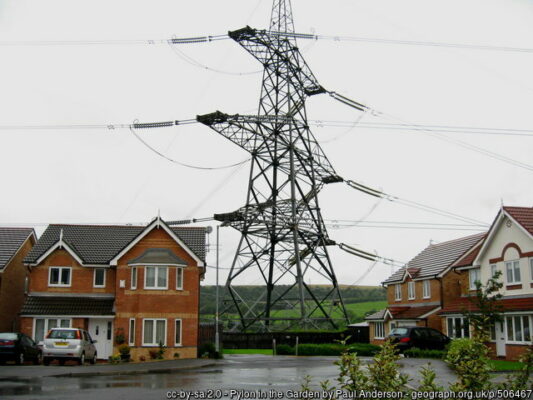
Duke Energy hid a plan for about 900 miles of new, expanded and upgraded high-voltage power lines, mostly crisscrossing southeastern
North Carolina, in the fine print of the 2022 Carbon Plan.
Duke leaders continue to block cheaper, faster alternatives to their climate-wrecking fracked gas expansion. Read our report, “Moving North Carolina Forward: The Case for Local Solar-Plus-Storage.”
Governor Cooper and Attorney General Stein must investigate. 84 solar companies, targeted groups and allies are demanding open discussion before Duke Energy locks in on its climate- and community-wrecking, rate-hiking plan. Read the letter here.
Quick Facts:
Duke Energy is quietly planning for major expansions of high-voltage transmission corridors that would worsen the climate crisis and target vulnerable communities.
A hint of these major plans was buried deep in the fine print of Duke Energy’s draft 2022 Carbon Plan.
Duke Energy continues limiting large-scale solar and making it more costly for years to come. NC WARN thinks Duke wants the grid expansion to accommodate new fracked gas and nuclear power projects.
Duke Energy’s plan also blocks local solar-plus-storage, which would avoid billions in transmission costs, disruption of communities and Duke’s huge expansion of fracked-gas power plants.
Local solar-plus-storage on roofs, parking lots and vacant areas is the fastest, cheapest – and should be the most equitable – way for NC to slow the climate crisis. Read our report, “Moving North Carolina Forward: The Case for Local Solar-Plus-Storage.”
It’s time for Governor Cooper and Duke Energy to stop pretending North Carolina is going in the right direction to help avert the climate crisis.
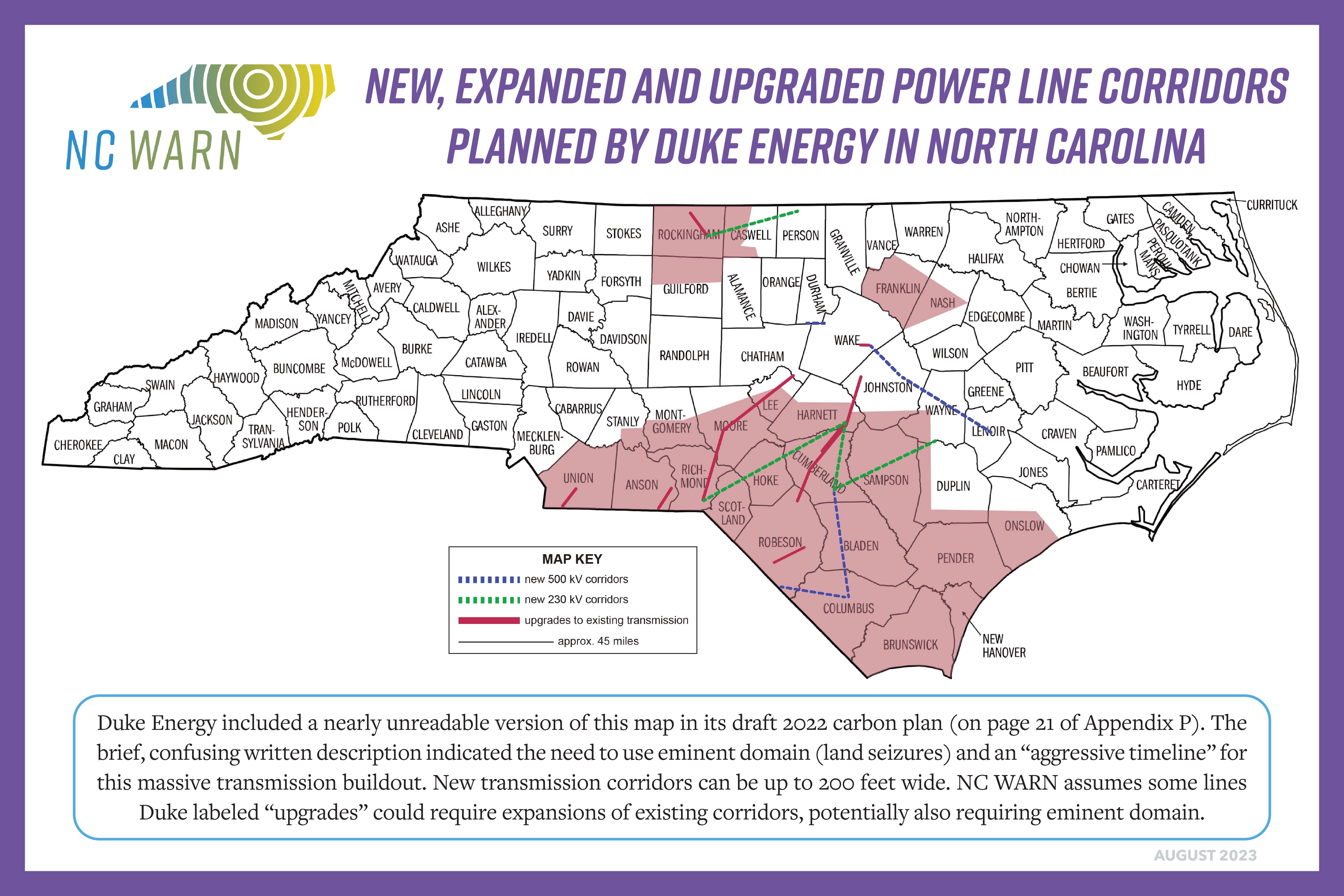
Local solar-plus-storage can be equitable – if North Carolinians share the costs and benefits the same way we’re now forced to share those stemming from dirty power plants and transmission. See how local solar helps all customers.
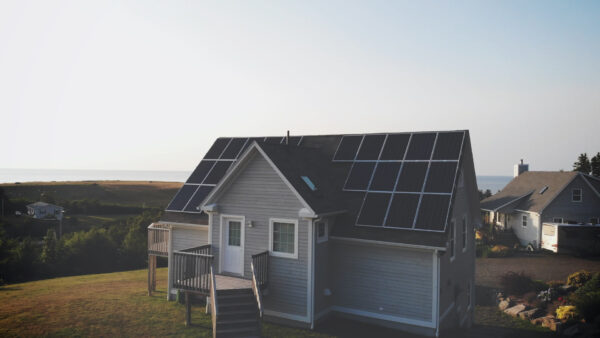
“In 2020 in the US…rooftop solar power officially became cheaper on average than grid power per delivered kilowatt hour. And therefore, now the cheapest, most reliable power can be produced renewably and produced at or near the customers that is distributed.”
– Amory Lovins, Rocky Mountain Institute
Take Action:

Contact the Governor & AG
Tell the Governor and Attorney General to investigate Duke's transmission plans.
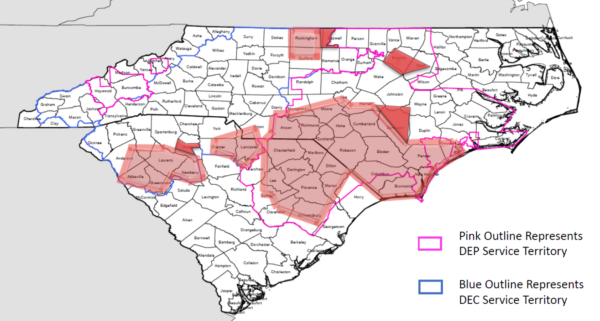
Duke Energy’s “red zone” includes rural areas in southeastern NC and across the SC line. Many of these communities have been historically targeted by destructive projects like the Atlantic Coast Pipeline, an $8 billion fracked gas project which community groups and supporters like NC WARN defeated in 2020.
Duke Energy’s Map: Intentionally Obscured?
Duke Energy tucked a larger section of this map of its transmission plans onto the 21st page of Appendix P of its 2022 draft Carbon Plan. See below a portion of Duke Energy’s muddled map (left) compared to our team’s legible version (right).
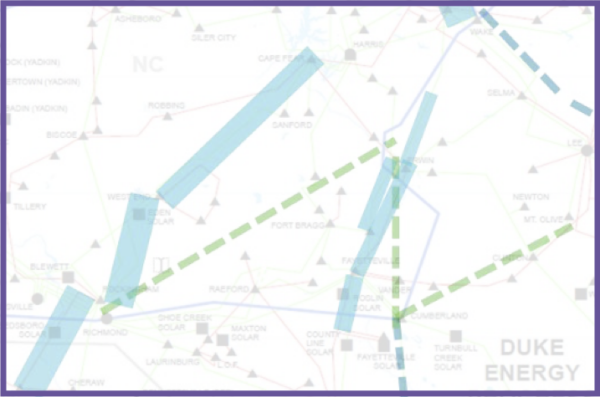

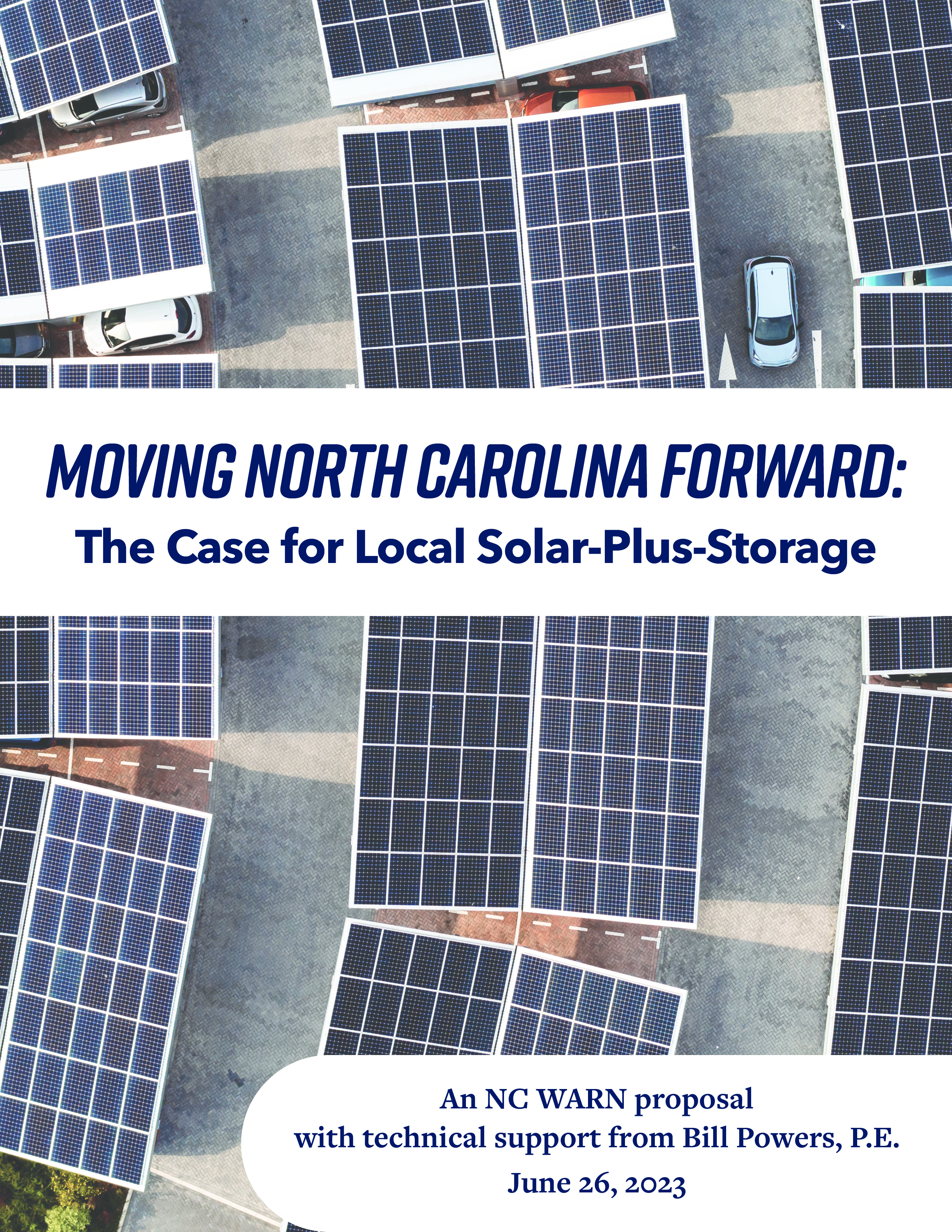
Resources
- Letter: Is Gov. Cooper a Climate Pretender?
- NC WARN Transmission Fact Sheet
- NC WARN's Report "Moving North Carolina Forward: The Case for Local Solar-Plus-Storage"
- Letter Seeking Investigation: Gov. Cooper and AG Stein, 6/26/23
- Contact Cooper and Stein!
- NC WARN Factsheet: See How Local Solar Helps All Customers
- Duke Energy's Proposed 2022 Carbon Plan
- Duke Energy's Transmission Buildout Plan
- "Who Needs Transmission Wires Anyway?" Local Energy Rules Podcast
- FreeingEnergy Podcast with guest Amory Lovins
Background
Deep in its 2022 proposed Carbon Plan, DukeEnergy quietly included plans for hundreds of miles and new, expanded and upgraded transmission corridors costing at least $9 billion. Duke referenced a need for an “aggressive timeline” to begin transmission construction, and NC WARN anticipates that Duke is already spending heavily on internal planning that is invisible to the people of North Carolina.
Duke Energy’s new transmission lines would run mainly through rural areas of both Carolinas, many of them low-income or communities of color that have been targeted by polluters for decades, and detrimentally impact farms, forests, and natural areas.
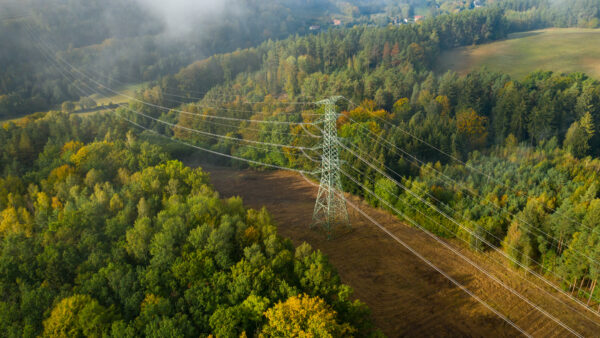
Duke Energy’s grid scheme would involve lots of forest destruction.
Duke has not revealed to what extent it would use eminent domain for new corridors or to expand existing transmission corridors. The people of North Carolina deserve to know – and be heard – before the bulldozers arrive.
Despite Duke Energy’s greenwashing, its NCUC-approved Carbon Plan would limit large-scale solar for many years and make the power costlier by applying much of the transmission costs to the price of electricity from new solar farms. Meanwhile, some 45 scientists have pressed Gov. Cooper to stanch Duke Energy’s huge expansion of power generation from methane gas, arguing that curbing methane emissions is the fastest way to help with the climate crisis.
Duke Energy and the NC Utilities Commission have declined to analyze alternatives to Duke’s expensive and damaging plan. NC WARN’s new proposal, “Moving North Carolina Forward: The Case for Local Solar Plus-Storage,” written with technical support from engineer Bill Powers, details the ways in which local solar-plus-battery storage can function as a less expensive and more equitable alternative to Duke’s transmission buildout plan.
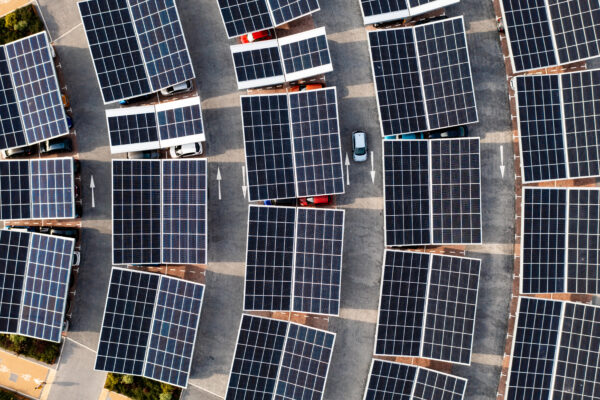
“There is more than 2.5 times the available solar capacity on roofs, parking areas and vacant lots as needed to meet North Carolina’s decarbonization mandates.” – NC WARN’s “Moving NC Forward,” based on data from the National Renewable Energy Lab
North Carolina has a huge potential for local solar power – on roofs of schools, stores, warehouses, homes, etc. – that could be built quickly, inexpensively and equitably while creating thousands of jobs and helping slow the global climate crisis.
NC WARN is calling on Governor Cooper and Attorney General Stein to investigate Duke Energy’s true intentions and activities with respect to its proposed transmission buildout. Important decisions regarding NC’s climate future should be dealt with in an open and transparent manner – not tucked away under a thousand pages of text.
North Carolina is at a crossroads. Will we double down on an inefficient, slowing moving transmission buildout and watch the climate crisis worsen? Or will we change course toward a far faster, cheaper and more equitable path to reach Gov. Cooper’s carbon goals?
Recent News
Helene’s Grid Destruction Amplifies Need for Distributed Power With Storage — NC WARN News Release
Thousands of downed power poles, towers highlight the vulnerability of our electric grid and the need to stop expanding fossil fuels The people of NC WARN are deeply saddened by the unprecedented suffering across states devastated by Hurricane Helene. We applaud the courageous dedication of utility workers, FEMA and all …
SEE ALL Transmission POSTSDuke Officials Admit “High Risk” of Key Carbon Plan Element — NC WARN News Release
“Extremely difficult” to build billions in new power lines and towers through eastern NC; “so much opposition” can mean “you can’t get it done” Duke Energy’s 2022 promise to investors (see footnote 5) that it will pour $75 billion into high-voltage transmission projects in its monopoly states was belied recently …
SEE ALL Transmission POSTS







